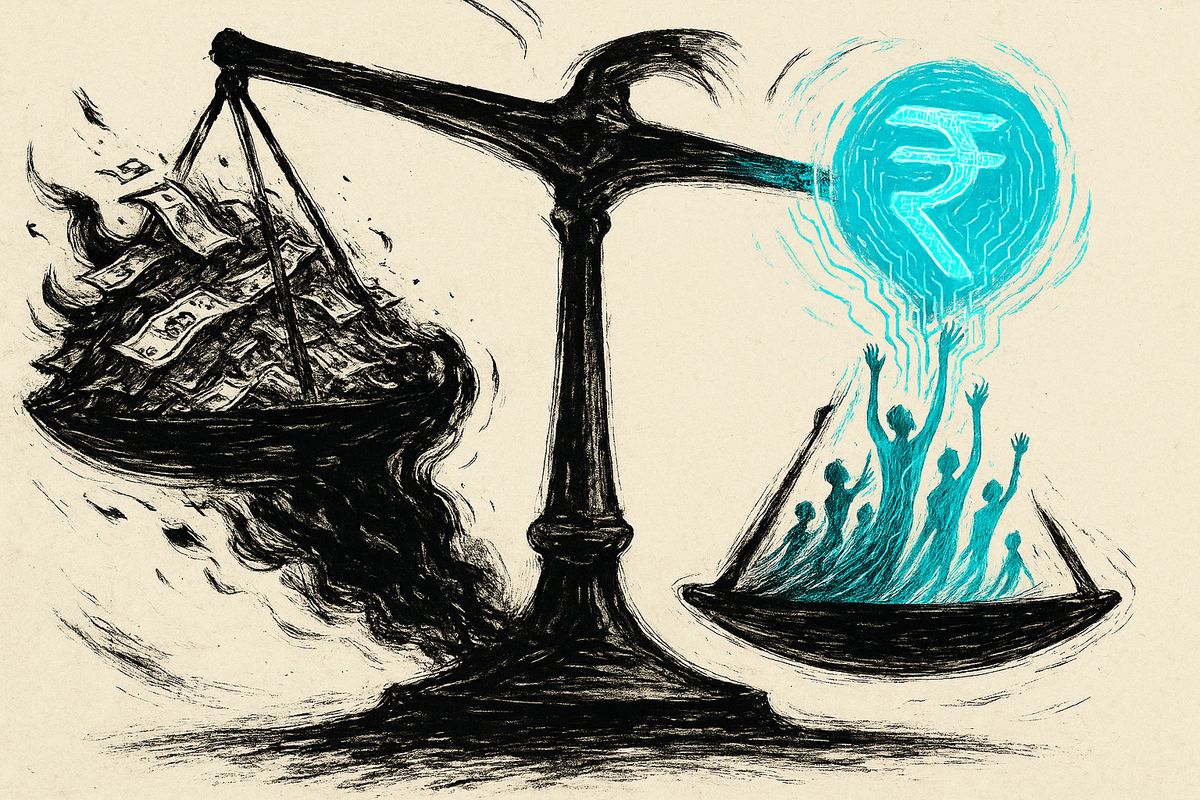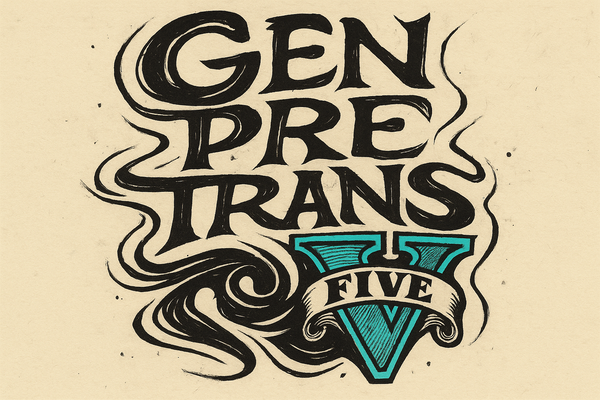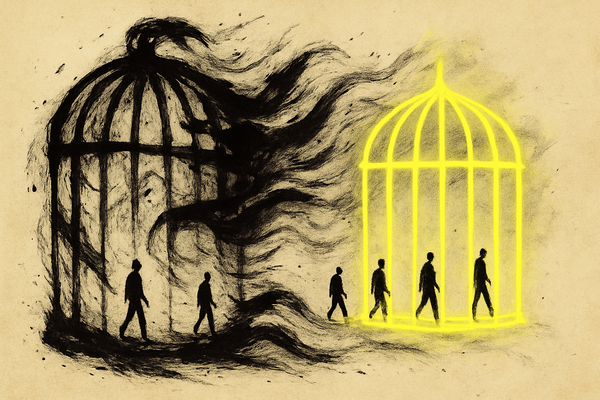ImaginEconomy Daily #18
OpenAI colonizes India at $4.60/month. AI recruiters beat humans by 12%. GPT-5 diagnoses 24% better than doctors. Grammarly predicts grades before submission. China's $1B GPU black market thrives. Google's LLMs browse directly. Nvidia makes reasoning toggleable. Expertise is dead.

ImaginEconomy 🧠 ✨ 💰 : Brands, Strategy, Story and Design in the Age of AI
1. OpenAI Cracks India's Market Code: ChatGPT Go at $4.60 Rewrites Global AI Access
OpenAI just obliterated the price barrier to AI intelligence with ChatGPT Go, a $4.60 monthly subscription exclusively for India; roughly the cost of a premium coffee. The plan delivers 10x higher message limits, image generation, and file uploads compared to the free tier, with full GPT-5 access and UPI payment integration. India, already OpenAI's second-largest market with 29 million app downloads in 90 days, generated just $3.6 million in revenue during that period: a conversion rate that CEO Sam Altman clearly found unacceptable. Nick Turley, VP and head of ChatGPT, positioned this as the first step in a broader geo-targeted pricing strategy that will expand to other emerging markets.
ImaginEconomy Impact: This isn't charity but colonization by affordability. OpenAI just weaponized pricing to lock in the next billion AI users before competitors even realize the game has changed. For global brands, this signals the death of one-size-fits-all AI strategies. Your Indian design team now has the same AI firepower as your New York creatives, but at 1/5th the cost. Smart agencies will arbitrage this immediately, routing certain workloads through Indian teams with Go subscriptions. But the real disruption is that when a billion new users start training AI on non-Western creative paradigms, the entire model of what "good" creative looks like can get rewritten.
Source: TechCrunch
2. The Synthetic Recruiter Revolution: AI Voice Agents Beat Humans by 12% in Hiring
A natural field experiment with 70,000 job applicants has delivered a verdict that should terrify every HR department: AI voice agents outperform human recruiters across every meaningful metric. The study found AI-led interviews increased job offers by 12%, job starts by 18%, and 30-day retention by 17%. When given the choice, 78% of applicants chose the AI interviewer over a human, with lower-scoring candidates showing even stronger preference for the machines.
ImaginEconomy Impact: The death of human bias (outside training data) in hiring is here, and it's 12% more effective. For creative agencies perpetually struggling with "culture fit" hiring that mysteriously produces homogeneous teams, this is a forced evolution moment. AI interviewers don't care about your portfolio school, your accent, or whether you "seem like" an agency person. They can evaluate actual capability and potential. But here's the subversive opportunity: program these agents with your agency's and agency people's actual performance data, not your aspirational culture deck. Let the machine hire for what drives results, not what looks good at your happy hour. The agencies that embrace AI hiring first won't just get better talent; they'll get different talent, and different is the only remaining competitive advantage.
Source: SSRN Research Paper
3. GPT-5 Demolishes Medical Experts: 24% Better at Diagnosis Than Licensed Physicians
GPT-5 hasn't just matched human medical expertise; it's rendered it obsolete in standardized settings. On multimodal medical reasoning benchmarks, GPT-5 surpassed pre-licensed human experts by 24.23% in reasoning and 29.40% in understanding, while GPT-4o performed 5-15% below human baselines. The latest model achieved this by integrating visual medical imaging with patient narratives and structured data, demonstrating what researchers call a "qualitative shift from near-human to clear super-human proficiency." Most striking: GPT-5's ability to synthesize X-ray findings with patient symptoms to recommend precise interventions that human doctors missed under time constraints.
ImaginEconomy Impact: If AI can out-diagnose doctors, what chance does your creative director have? This isn't about replacing human judgment. It's about exposing how much of what we call "expertise" is actually pattern recognition that machines do way better. The parallel for creative work is obvious: GPT-5 won't just analyze your brand guidelines; it'll diagnose why your campaigns keep failing. Feed it your creative output, performance metrics, and market context, and watch it identify patterns your award-winning CD never saw. The agencies still treating AI as a production tool while competitors use it for strategic diagnosis are like doctors still using stethoscopes while others deploy GPT-5. The malpractice isn't using AI; it's NOT using AI for the highest-value, highest-stake decisions.
Source: arXiv Medical Reasoning Study
4. Grammarly's Grade Prediction Engine: When AI Becomes Your Professor—Before Submission
Grammarly just transformed from grammar cop to oracle with AI agents that predict your grades, before assignment submission. The AI Grader agent analyzes assignments against uploaded rubrics, course information, and "publicly available instructor information" to estimate grades and provide tailored feedback. Eight specialized agents now handle everything from plagiarism detection to predicting reader reactions, with the system learning instructor preferences and grading patterns. With 40 million daily users and fresh funding of $1 billion from General Catalyst, Grammarly is betting that knowing your score in advance is worth more than fixing your semicolons.
ImaginEconomy Impact: Welcome to the pre-cognition economy, where failure becomes optional if you're willing to let AI preview your future. This isn't about cheating but about eliminating the feedback lag that makes learning inefficient; with AI you're always one learning loop ahead, instantly. Apply this to creative work: imagine AI agents that predict client reactions before the pitch, forecast campaign performance before launch, or estimate award potential before submission. The agencies still doing post-mortems are analyzing corpses while competitors are preventing deaths. When every junior can predict their CD's feedback and every CD can forecast client responses, the entire apprenticeship model of creative development collapses. Why learn from mistakes when you can learn from prevented mistakes? When AI can predict grades, the value of human grading evaporates.
Source: Business Wire
5. Inside China's GPU Black Market: The $1 Billion Underground Keeping AI Dreams Alive
Gamers Nexus just released a 3.5-hour documentary exposing the sophisticated smuggling networks moving banned Nvidia GPUs into China, revealing an underground economy worth billions. The investigation shows RTX 5090s and H100s being sold at 50% premiums through Hong Kong middlemen, with chips hidden in prosthetic baby bumps, alongside live lobsters, and carried by students earning $1,400 per card. Repair shops in Shenzhen service 500 banned GPUs monthly, while some operations modify consumer RTX 4090s to 48GB memory configurations. Despite export controls, distributors openly advertise on Douyin and Xiaohongshu, with one smuggler comparing GPU availability to "a seafood market."
ImaginEconomy Impact: While Washington plays trade war theater, the actual war is being fought in Shenzhen repair shops and Hong Kong loading docks. This isn't just about chips; it's about the futility of trying to contain high-value intelligence. Every smuggled GPU trains another Chinese model, every modified 4090 powers another startup that your clients will eventually compete against. The lesson for Western agencies: your competitive advantage was never the hardware, and Chinese companies building AI capabilities on black market GPUs are hungrier than you'll ever be. If a nation will pay 50% premiums and its nationals want to risk prison to access AI compute, what do they know that your agency doesn't? The brands treating AI as optional while Chinese competitors treat it as existential are writing their own obituaries.
Source: VideoCardz Documentary Coverage
6. Google's URL Context Tool: When LLMs Learn to Browse Without the Theater
Google Gemini now fetches and analyzes webpage content directly through its new URL Context tool, eliminating the need to copy-paste content or craft elaborate prompts. The tool processes full HTML, images, and structured data from any provided URL, going beyond search snippets to ingest entire pages for analysis. Unlike standard browsing, it skips JavaScript execution, focusing on raw content comprehension. Rate limits now match model-specific tiers rather than arbitrary caps, with costs based purely on input tokens, making pricing predictable for production deployments.
ImaginEconomy Impact: Google just eliminated the last friction between AI and the internet—context without copy-paste, comprehension without screenshots. For agencies, this means your AI can now audit competitor campaigns, analyze client websites, and monitor brand mentions in real-time without human preprocessing. And when AI can fetch and understand any webpage instantly, the value of 'information curation' vanishes. Your proprietary trend reports, competitive analyses, and market insights become regurgitated commodity the moment they hit the web. The strategic response is dynamic, context-aware, smart workflows and intelligent, adaptive applications. Agencies that still treat web content as static resources in a static process are playing checkers in a chessboxing game.
Source: Google Developers Blog
7. Nvidia's Reasoning On Demand: Nemotron-Nano Brings Intelligence Toggle to Edge Computing
Nvidia's Nemotron-Nano-9B-V2 introduces the industry's first reasoning toggle for edge deployment, allowing developers to switch between standard responses and deep reasoning with simple control tokens. The model uses a hybrid Mamba-Transformer architecture to achieve 2-3x higher throughput on long contexts while fitting on a single A10 GPU. Compressed from 12B to 9B parameters specifically for accessible deployment, it still achieves 72.1% on AIME25 and 97.8% on MATH500 benchmarks. Released under Nvidia's permissive open license, enterprises can deploy immediately without usage fees or revenue restrictions.
ImaginEconomy Impact: Nvidia just democratized intelligence throttling—pay for genius only when you need it. This isn't just efficient; it's economically transformative. Imagine creative tools that activate advanced reasoning only for final renders, or strategy platforms that engage deep analysis only for critical decisions. The agencies buying cloud-based AI for everything are like people taking helicopters to the corner store. But the real disruption is psychological: when reasoning becomes toggleable, it becomes visible. Clients will start asking why you're using "reasoning mode" for their brief, teams will question when to engage "thinking tokens," and suddenly the black box of creative decision-making gets itemized. The profession that prided itself on mysterious genius now has to justify when it's worth turning on.
Source: VentureBeat
Bottom Line: The Expertise Extinction Event
Today's developments mark the precise moment human expertise became optional. OpenAI prices intelligence by geography, AI recruiters outperform humans by 12%, GPT-5 diagnoses better than doctors, and Nvidia makes reasoning toggleable. The message is unanimous: specialized knowledge is now a commodity with adjustable intensity.
But here's the revelation: Nvidia's reasoning toggle isn't just a feature—it's the future's business model. We're entering the age of graduated intelligence, where you dial up genius for the pitch and dial it down for production. Pay for deep thinking by the token, not the title.
For brands and agencies, the monopoly on expertise just ended. When anyone can access medical-grade diagnosis or professional reasoning for coffee money, the value chain doesn't shift—it shatters.
The winners won't be those clinging to credentials but those who grasp that intelligence is now ambient, affordable, and adjustable. Your expertise is worth exactly what it costs to replace it.
Price accordingly.
ImaginEconomy Daily Newsletter is curated for brand, business and marketing strategists, creatives, and leaders navigating the intersection of technology and human experience.




